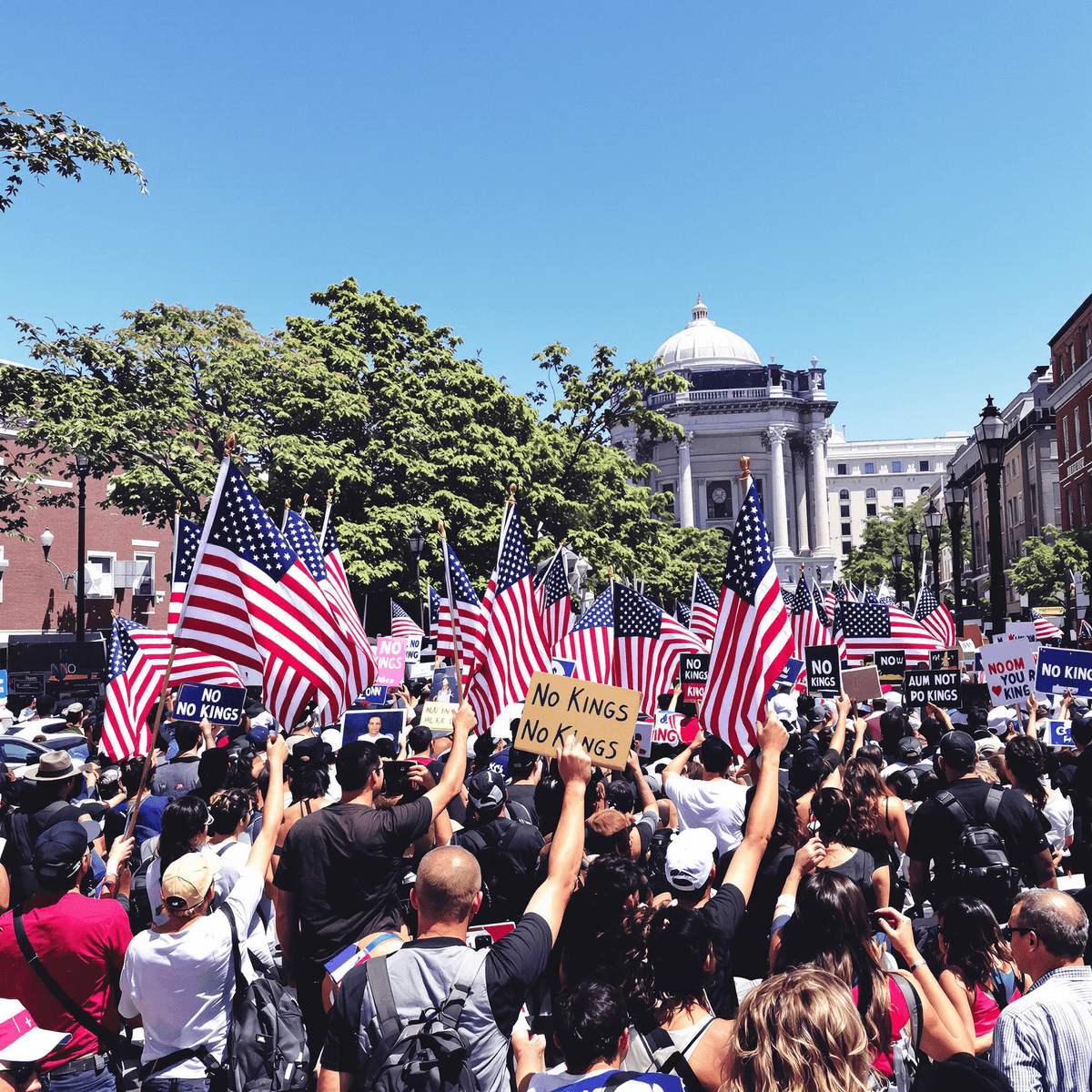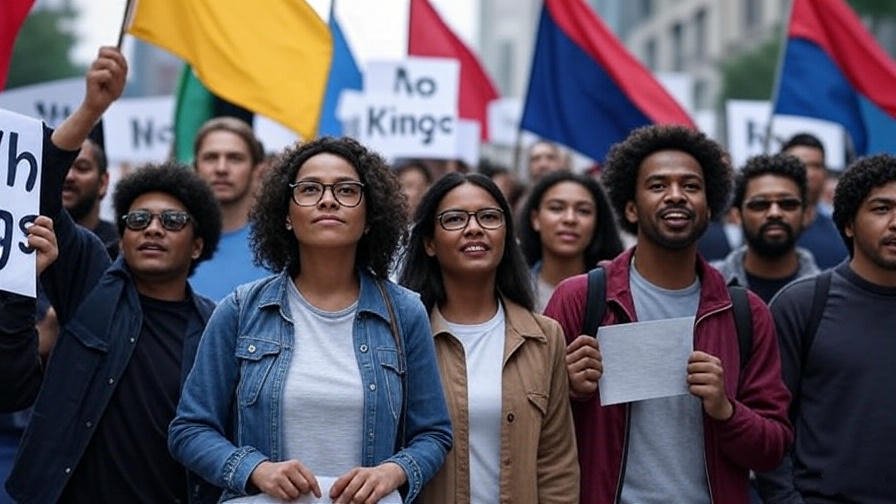
The No Kings protest is set to become America’s largest coordinated demonstration against authoritarian power, taking place nationwide on June 14, 2025. This unprecedented event will bring together citizens in nearly 2,000 locations across every state, with a deliberate absence in Washington D.C.
The significance of the date is heightened by its overlap with three important occasions:
- The U.S. Army’s 250th anniversary military parade
- Flag Day
- Former President Donald Trump’s 79th birthday
This nationwide act of defiance is a direct response to what many Americans see as an increase in authoritarian tendencies within U.S. politics. The protest’s name – “No Kings” – conveys a clear message: Americans reject any form of monarchical or authoritarian rule.
Over 200 organizations, including the American Civil Liberties Union (ACLU), American Federation of Teachers, Indivisible, and various local grassroots groups, are working together to make this movement a success.
The protest will take place in both urban and rural areas, ensuring that voices from all walks of life are heard. Demonstrations are planned in various locations such as Philadelphia’s historic center, community parks in Minneapolis, public squares in Cincinnati, and Portland’s waterfront.
This massive mobilization represents a crucial moment for American democracy as citizens come together to uphold democratic values and push back against displays of authoritarian power.
Origins and Motivations Behind the ‘No Kings’ Protest
The ‘No Kings’ protest was sparked by a controversial military parade scheduled for June 14, 2025, in Washington D.C. This date holds multiple significant meanings:
- U.S. Army’s 250th Anniversary celebration
- President Donald Trump’s 79th birthday
- Flag Day – a traditional American patriotic observance
What to Expect at the Military Parade
The military parade, estimated to cost between $25-45 million, includes:
- Thousands of active-duty soldiers
- Military aircraft displays
- Armored vehicle processions
- Mounted cavalry units
Concerns Raised by Critics
Critics argue the parade’s true purpose extends beyond celebrating the Army’s milestone. The unprecedented scale of this peacetime military display raises concerns about its underlying message. Many view it as a deliberate show of force designed to project presidential power rather than honor military service.
Organizations Leading the Resistance
A powerful coalition of over 200 organizations has united to challenge this display of military might. Key organizations leading the resistance include:
- American Civil Liberties Union (ACLU)
- American Federation of Teachers
- Indivisible
- Multiple grassroots activist groups
These organizations see the parade as symptomatic of broader authoritarian tendencies. The choice to hold such an extensive military display on the president’s birthday particularly troubles protest organizers, who interpret it as an attempt to blur the lines between military appreciation and personal glorification.
Historical Context and Concerns
The coalition points to historical precedents where military parades served as tools of authoritarian regimes. They argue that peaceful democracies typically reserve such displays for victory celebrations or specific military achievements, not peacetime demonstrations of power.
Countering with Civilian Presence
The protest organizers have strategically chosen to counter this display of military might with widespread civilian presence across the nation. By coordinating protests in nearly 2,000 locations, they aim to demonstrate that true democratic power resides with the people, not in carefully orchestrated shows of force in the capital.
Ideology and Message of the ‘No Kings’ Protest
The ‘No Kings’ protest movement stands on a fundamental principle: America rejects monarchical rule. This message resonates through every planned demonstration, emphasizing that true democratic power belongs to the people, not concentrated in displays of military might in Washington.

The movement’s core ideology centers on three key pillars:
- Democratic Reclamation: Taking back American symbols and values from authoritarian control
- People-Centered Power: Shifting focus from military displays to citizen action
- Sustained Resistance: Building lasting opposition against authoritarian politics
The protest draws significant inspiration from historic mobilizations. The Hands Off! movement of the 1960s demonstrated the power of unified citizen action against government overreach. Similarly, the May Day protests showed how coordinated nationwide demonstrations could effectively challenge authority structures.
The message of ‘No Kings’ extends beyond a single day of protest. It represents a broader cultural shift:
“We’re not just protesting a parade. We’re fighting for the soul of American democracy,” says Sarah Martinez, lead coordinator for the Western states coalition.
The movement’s symbolism deliberately counters traditional displays of power:
- Choosing local gathering spaces over military parade grounds
- Using American flags alongside protest signs
- Creating community-led events rather than top-down demonstrations
This approach mirrors successful resistance movements throughout history, where citizen-led initiatives effectively challenged authoritarian tendencies. The protest’s messaging emphasizes that democratic power flows from communities upward, not from authority figures downward.
The ‘No Kings’ ideology connects with broader democratic traditions, positioning itself as a guardian of constitutional principles rather than a mere opposition movement. Protest organizers have developed specific messaging guidelines that emphasize positive democratic values while rejecting authoritarian practices.
Nationwide Participation and Locations of the ‘No Kings’ Protest
The “No Kings” protest has sparked unprecedented nationwide mobilization, with nearly 2,000 demonstration sites spread across 49 states. Each state hosts multiple gathering points, ranging from major metropolitan areas to small rural communities.
State-by-State Participation Highlights:
- California leads with 250+ locations
- Texas follows with 180+ protest sites
- New York mobilizes 150+ gathering points
- Florida coordinates 120+ demonstration areas
Philadelphia stands as the symbolic heart of the protest movement. The city’s selection pays homage to its role as the birthplace of American democracy and resistance against monarchical rule. Independence Hall serves as the central gathering point, where protestors will assemble in the same location where the Declaration of Independence was signed.
The strategic decision to exclude Washington D.C. from the protest locations reinforces the movement’s core message. Instead of congregating in the capital, organizers direct participants to join the Philadelphia demonstrations, creating a powerful visual statement against centralized power displays.
Local coordinators have secured permits for demonstrations in:
- Public parks
- City squares
- Community centers
- University campuses
- Historic sites
Each location features designated assembly points, first aid stations, and volunteer peacekeepers to ensure safe, organized participation.
Guiding Principles for Nonviolent Action During the ‘No Kings’ Protest
The ‘No Kings’ protest movement places [nonviolent resistance](https://www.d
Addressing Broader Issues Within the ‘No Kings’ Protest Movement
The ‘No Kings’ protest extends beyond resistance to authoritarianism, addressing critical policy changes affecting millions of Americans. The movement spotlights severe immigration crackdowns, including:
- Family separation policies at the border
- Increased ICE raids in sanctuary cities
- Restrictions on legal immigration pathways
- Cuts to asylum programs
Federal workforce reductions have created significant disruptions across government agencies, with a reported 15% staff reduction in environmental protection departments and hiring freezes affecting essential public services. Additional challenges include budget cuts impacting federal employee benefits and reduced workplace protections for government workers.
These policy changes reflect a broader pattern of centralized control and institutional dismantling. Protest organizers emphasize the interconnected nature of these issues:
“When we say ‘No Kings,’ we’re rejecting the entire system of power that enables these harmful policies. This isn’t just about one parade or one person – it’s about protecting our democratic institutions.”
Local protest groups have incorporated region-specific concerns into their demonstrations. California chapters focus heavily on immigration rights, while East Coast protesters emphasize federal workforce protection. This adaptability strengthens the movement’s relevance across diverse communities and ensures that each protest location addresses issues directly affecting its participants.
Participating in Your Local ‘No Kings’ Protest: What You Need to Know
Finding your local “No Kings” protest location is straightforward through the official protest website: NoKingsProtest2025.org. Enter your zip code in the location finder to discover nearby gathering points and event details.
Here’s what you’ll need for the day of action:
Essential Items
- Water and snacks
- Comfortable walking shoes
- Weather-appropriate clothing
- Valid ID
- Face mask
- Hand sanitizer
Recommended Safety Measures
- Save the legal aid hotline: 1-800-NO-KINGS
- Write emergency contacts on your arm
- Download the protest safety app
- Bring a portable charger
The protests begin at 10 AM local time across all locations. You’ll receive a detailed schedule and route map upon registering through the website. Each location features designated protest marshals wearing yellow vests who can guide you and answer questions.
Local organizers provide on-site first aid stations, water distribution points, and legal observers. Many locations offer sign-making stations starting two hours before the main event. Carpooling options are available through the protest website’s community board.
Remember to check your specific location’s guidelines – some cities require advance registration or have specific assembly points based on crowd size expectations.
Conclusion
The “No Kings” protest is a crucial moment in America’s battle against authoritarian politics. Every voice matters – when we speak up together, we strengthen our fight for democracy and the Constitution.
This nationwide movement goes beyond just one day of action. It’s a promise to always protect our democratic institutions and push back against the acceptance of authoritarian power. Our strength comes from our diversity, unity, and commitment to peaceful resistance.
The future of American democracy relies on ongoing civic involvement. Mark your calendars for June 14, 2025, and stay connected with local organizing groups for upcoming events. Together, we’ll build a strong network of activists dedicated to upholding democratic values.
Take Action Now:
- Sign up for protest updates at nokingsprotest.org
- Connect with local organizers in your area
- Share your commitment using #NoKings on social media
We must act now to oppose authoritarianism. Will you join us?
FAQs (Frequently Asked Questions)
What is the ‘No Kings’ protest and when is it taking place?
The ‘No Kings’ protest is a nationwide day of defiance against authoritarianism, scheduled for June 14, 2025. It involves nearly 2,000 locations across all U.S. states except Washington D.C., aiming to reject monarchical rule and reclaim democratic values.
Why is the ‘No Kings’ protest held on June 14, 2025?
The protest coincides with the U.S. Army’s 250th anniversary military parade, President Donald Trump’s birthday, and Flag Day. Organizers view the military parade as a show of dominance and power, making June 14 a symbolic day to oppose authoritarian politics through nationwide demonstrations.
What is the main ideology behind the ‘No Kings’ protest?
The protest emphasizes rejecting authoritarianism and monarchical rule while reclaiming democratic principles. Inspired by historic mobilizations like Hands Off! and May Day, it opposes staged displays of power in Washington and advocates for genuine democratic governance.
How can I find a local ‘No Kings’ protest near me?
With nearly 2,000 locations participating nationwide except Washington D.C., you can find your local ‘No Kings’ protest by visiting official resources such as nokings.org or searching online for ‘no kings protest near me.’ Many cities including Philadelphia, Minneapolis, San Francisco, and others have organized gatherings.
What are the guidelines for participating in the ‘No Kings’ protest?
Participants are encouraged to engage in nonviolent action, practice de-escalation techniques, and maintain lawful behavior during demonstrations. The movement stresses safety and peaceful resistance to ensure effective opposition against authoritarian politics.
Does the ‘No Kings’ protest address issues beyond opposing authoritarianism?
Yes, alongside rejecting authoritarian politics, the movement highlights broader concerns such as immigration crackdowns under the Trump administration and federal workforce cuts. It seeks comprehensive social justice reforms while sustaining opposition through continued mobilizations.
